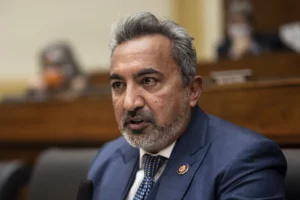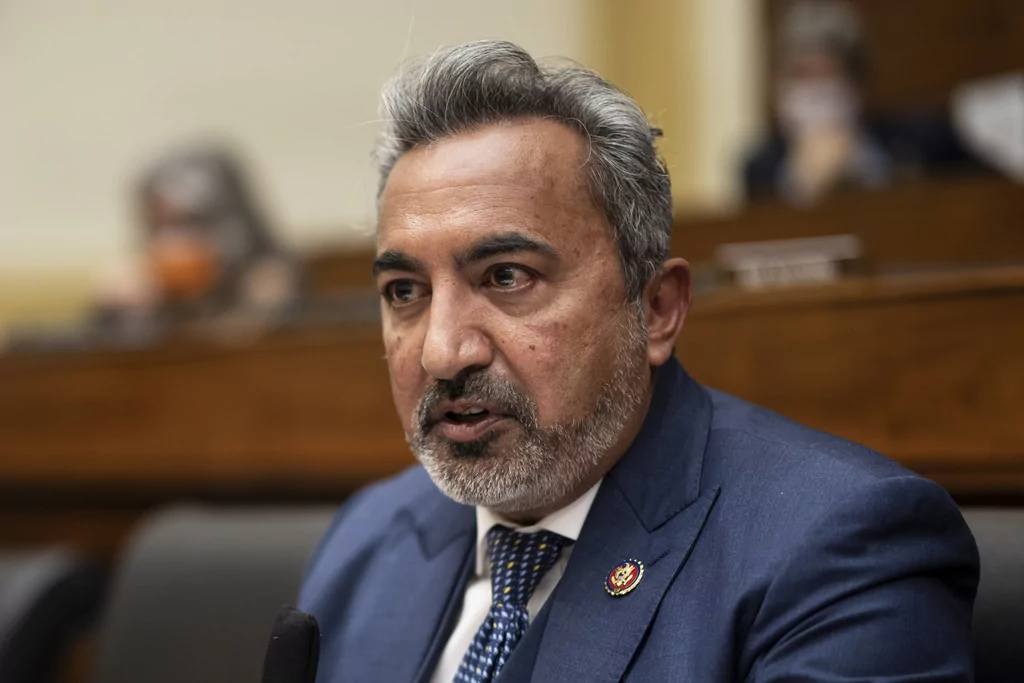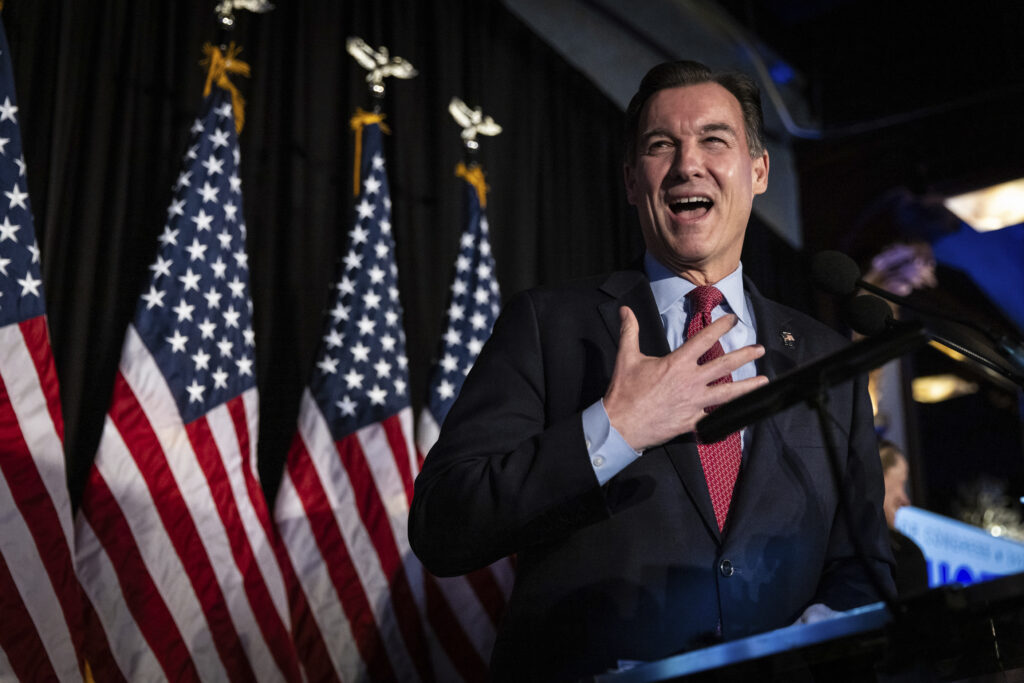
As Democrats seek to rebound from crushing defeats in November 2024, some are signaling increasing willingness to work with the Republicans to pass some of President-elect Donald Trump’s top priorities.
From addressing Trump’s concerns about illegal immigration and cutting government spending to backing tax cuts and other reforms, Democrats are starting to favor bipartisanship over polarization.
Their softening resistance to Trump comes as polling conducted after the election indicated that voters trust Republicans more than Democrats to handle the economy, immigration, and other issues of top concern. The majority of respondents in the survey also viewed Democrats as weak and out-of-touch, while Republicans were seen as “in touch” and tough.
Immigration
Bipartisan momentum is increasing for immigration reform, particularly as Congress considers the Laken Riley Act. The legislation is named after a Georgia nursing student who was sexually assaulted and murdered by an illegal immigrant while she was jogging, and it would require the Department of Homeland Security to detain undocumented immigrants arrested, charged, or convicted for theft-related crimes.
Forty-eight House Democrats voted in favor of the bill on Tuesday, marking an increase from the 37 who backed the legislation in March 2024.
Rep. Jared Moskowitz (D-FL) credited the uptick in Democratic support to how his colleagues are responding to digesting the election results, telling Punchbowl News that immigration was “on the ballot” in November.
“I don’t think the American people want extremism, but they do want changes at the border,” Moskowitz said. “On some of these issues, we were to the left of the American people.”

“We should pursue every opportunity around border security and immigration reform,” Rep. Greg Landsman (D-OH) added. “That’s No. 1.”
Landsman and Mokskowitz’s take on immigration reform follows recent Axios polling showing the majority of Democratic voters feel that “illegal immigration is a problem” and believe that there is a crisis at the border.
Support in the upper chamber has grown for the Laken Riley Act as well since last year, with Sens. Gary Peters (D-MI), John Fetterman (D-PA), Ruben Gallego (D-AZ), and Elissa Slotkin (D-MI) signaling they will vote for the legislation. Sen. Jon Ossoff (D-GA) will also back the bill, per a new Politico report.
Fetterman is even a co-sponsor of the Laken Riley Act, which is scheduled to be brought to the Senate floor for a vote on Friday.
“Laken Riley’s story is a tragic reminder of what’s at stake when our systems fail to protect people,” Fetterman said in a statement. “No family should have to endure the pain of losing a loved one to preventable violence. Immigration is what makes our country great. I support giving authorities the tools to prevent tragedies like this one while we work on comprehensive solutions to our broken system.”
Economy
Tax policy and credit card interest rates are among the issues that may gain bipartisan steam this Congress.
Trump’s 2017 Tax Cuts and Jobs Act set a temporary limit on deductions taxpayers can receive from property, sales, and income taxes paid to state and local governments, known as the SALT cap.
When Trump backed lifting the SALT cap on the campaign trail last year, he garnered positive feedback from some lawmakers on the other side of the aisle, particularly from House Democrats, including Reps. Josh Gottheimer (D-NJ), Laura Gillen (D-NY), Josh Riley (D-NY), and Pat Ryan (D-NY).
“While I don’t agree with President-elect Trump on much, I’ll work with anyone to lower the cost of living and deliver economic relief,” Ryan said. “I’m taking Trump at his word that he wants to permanently lift the cap and am calling on him to immediately start working in good faith with both Democrats and Republicans so the SALT Deductibility Act is ready to pass on the first day of the 119th Congress.”
Renewing expiring tax cuts is another issue some Democrats may be willing to work on with Trump. The president-elect has publicly pushed the other side of the aisle to come to the table on the matter, arguing that many people would face tax increases if lawmakers refuse to approve an extension to his signature 2017 tax cuts.
“I can’t imagine that they would not approve,” Trump said Monday on The Hugh Hewitt Show. “This would be the largest tax increase in the history of the world, OK, let alone in this country. And I can’t imagine the Democrats would do that to this country and do that to the people just because they happen to dislike Republicans or me.”
Rep. Ami Bera (D-CA) suggested the same day that renewing the tax cuts was among the Republican priorities he and other Democrats might be willing to negotiate.
“I think we’re going to try to work with Republicans,” Bera said. “Let’s meet at the 50-yard line. I’d even say, since they’re in the majority, we’ll go to the 40-yard line. But negotiate with us. What does that look like?
“If we can negotiate in the middle, I think there’s a deal to be had,” the California Democrat concluded.

Trump’s push to cap credit card interest is another proposal that has gained support from some Democrats. When he backed the idea of having the federal government cap credit card interest rates at 10% in September 2024, Sens. Bernie Sanders (I-VT) and Elizabeth Warren (D-MA) were quick to take him up on the proposal.
“If Donald Trump really wants to take on the credit card industry, count me in,” Warren said in late November.
Sanders introduced legislation last month that echoed Trump’s promise to crack down on interest rates.
“During the recent campaign, Donald Trump proposed a 10% cap on credit card interest rates,” the Vermont senator said in a statement to X. “Great idea. Let’s see if he supports the legislation that I will introduce to do just that.”
Congressional Progressive Caucus Chairman Greg Casar (D-TX) has similarly expressed enthusiasm for Trump’s plan, telling Punchbowl News “We’re here to support good policies like that.”
DOGE
A number of Democratic lawmakers have embraced Trump’s new Department of Government Efficiency. Spearheaded by Elon Musk and Vivek Ramaswamy, with DOGE caucuses now established in both chambers of Congress, Trump’s initiative is scrutinizing federal spending and looking to slash the bureaucracy.
Reps. Ro Khanna (D-CA), Val Hoyle (D-OR), Marc Pocan (D-WI), Ritchie Torres (D-NY), Jared Golden (D-ME), Tom Suozzi (D-NY), Landsman, and Moskowitz are among the House Democrats who have signaled that they are open to tackling concerns about “wasteful” defense spending and other issues.
Moskowitz became the first Democrat to join a new House DOGE caucus following the election. Hoyle joined the committee in December 2024, saying, “Anyone who thinks there aren’t opportunities to make government more efficient and effective is not living in the real world.”
“This isn’t a partisan issue,” Hoyle added.
Suozzi similarly told Axios that “Democrats and Republicans should work together to make government more efficient without hurting people, and whatever we can come up with as a team would be great.”

In the upper chamber, Sens. Chris Coons (D-DE), Ed Markey (D-MA), and Sanders have also suggested they might be willing to negotiate DOGE reforms.
Sanders, in particular, has criticized the Defense Department for failing multiple audits, saying Musk was right to use the DOGE to investigate where Pentagon funds are going.
CLICK HERE TO READ MORE FROM THE WASHINGTON EXAMINER
Whatever stance Democrats end up taking on Trump’s priorities after he takes office, their concern right now about finding the right balance between fighting for partisan priorities versus alienating voters is real.
“The reason why I think, oftentimes, Democrats occasionally lose elections is because we’re too reflexively anti-Republican and that we don’t lean into an ambitious vision for working-class Americans strongly enough,” Rep. Alexandria Ocasio-Cortez (D-NY) told Punchbowl News.







